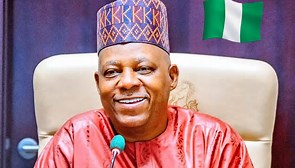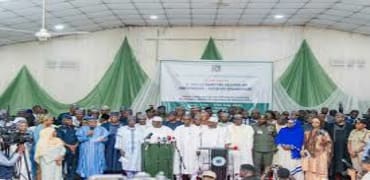Shettima Launches Programme to Repurpose Thousands of Abandoned Public Assets Nationwide
Shettima Launches Programme to Repurpose Thousands of Abandoned Public Assets Nationwide
By Achimi muktar
What if Nigeria’s long-forgotten tractors, rusting machinery, and abandoned public assets could fuel an industrial and agricultural revolution?
Vice President Kashim Shettima believes they can—and he’s determined to prove it.
On Sunday, Shettima unveiled the ambitious National Asset Restoration Programme (NARP), spearheaded by the National Agency for Science and Engineering Infrastructure (NASENI). The initiative aims to breathe new life into tens of thousands of abandoned assets and machinery scattered across the country.
“This is a transition to unlock the potential and productivity of Nigeria’s agricultural, industrial, and creative sectors,” Shettima declared during the official launch held at Borno State Agricultural Mechanisation (BOSAMA) Farm Centre in Maiduguri.
In attendance were key stakeholders, including Borno State Governor Babagana Umara Zulum, Minister of Agriculture and Food Security Abubakar Kyari, and NASENI Executive Vice Chairman Khalil Suleiman Halilu—all united by a common goal: to end Nigeria’s culture of waste and abandonment.
“Enough is Enough”
“For too long, Nigeria has been known for its poor maintenance culture,” Shettima said, his voice resonating with conviction during a nationally televised address.
“Enough of investing scarce resources in projects that get abandoned halfway. Enough of letting critical assets waste away while we keep budgeting for the problems they were meant to solve.”
The Vice President’s frustration is backed by staggering data: over 26,000 units of broken but serviceable heavy-duty equipment and nearly 500,000 component scraps lie unused across Nigeria. Meanwhile, the nation struggles with only 7,000 to 12,000 functional tractors, despite needing a whopping 2.4 million to achieve its food production goals in the next decade.
A National Tragedy Turned Opportunity
The numbers paint a grim picture—but also a golden opportunity. According to Shettima, these neglected assets represent “a national inventory of value waiting to be unlocked.”
Through NARP, NASENI is poised to lead the charge. The agency has already shown promise in areas like CNG retrofitting, renewable energy technologies, and agricultural mechanisation. Now, it’s turning its expertise toward transforming disused public assets into tools for national progress.
“This initiative will not only restore hardware,” Shettima noted, “but will also serve as a platform for technology transfer, homegrown engineering, and adaptive innovation.”
Why It Matters
The Asset Restoration Programme aligns squarely with President Bola Ahmed Tinubu’s vision of building a productive, self-reliant, diversified economy.
By revitalising abandoned infrastructure, the government hopes to:
✅ Boost industrial productivity
✅ Strengthen agricultural output
✅ Drive job creation
✅ Foster local innovation
But success, Shettima stressed, depends on collective effort.
“You, the Nigerian public, are the other half of this work,” he said. “If we restore these vital assets, we must all protect them. They belong to each Nigerian—they are our national inheritance.”
The Engine Behind the Vision
NASENI, the only purpose-built intervention agency of the Federal Government under the Presidency, was created to drive home-initiated and home-sustained industrialisation. Its broad mandate includes developing capital goods, equipment, and processes essential for national progress.
Now, with the Asset Restoration Programme, NASENI is poised to become an engine of transformation—turning Nigeria’s forgotten assets into engines of growth.
As Shettima put it: “We can’t create durable Nigerian solutions to Nigerian problems unless we localise global technologies and unlock the value already in our hands.”
The message is clear: Nigeria’s future might just be hiding in plain sight—in the rusting tractors, idle machines, and abandoned tools waiting for a second chance.


















